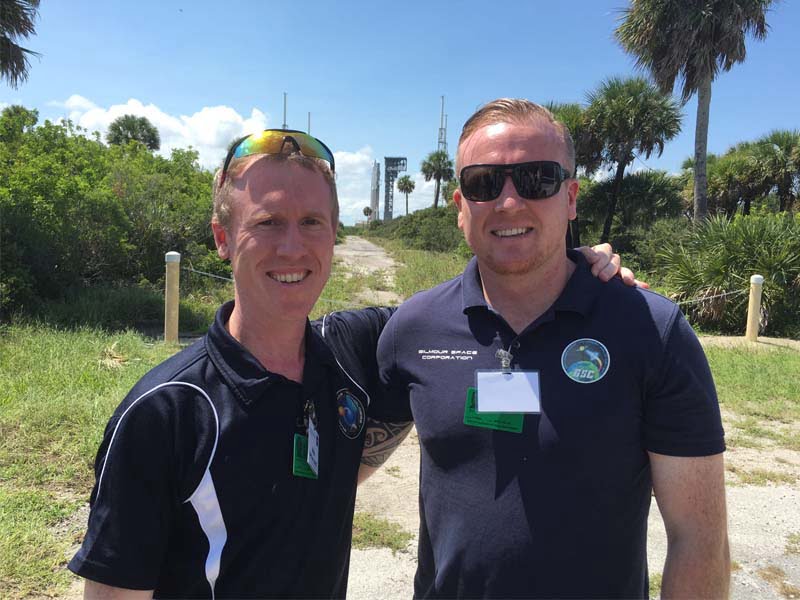Geographically they may live worlds apart – one resides on the Gold Coast and the other in Singapore. But it doesn’t bother the brothers James and Adam Gilmour, who are determined to grow their company Gilmour Space Technologies to compete in the same realm as space transport companies like Elon Musk’s SpaceX.
“We’re not necessarily looking to fulfil or supply to the domestic market. We’re actually looking to compete with the global space industry,” says Gilmour Space Technologies’ director James Gilmour.
“Satellite and other space technologies are getting significantly smaller and a lot more capable. We’re looking to be part of that,” he said.

Last year, the pair successfully test launched its hybrid rocket using proprietary 3D-printed fuel. The brothers are now working towards launching two low-cost sounding rockets into suborbital space by next year.
The first, which due for launch during the first quarter of next year, will aim for an altitude of 70km, and the second will be launched by the end of 2018 and is expected to hit an altitude of 100km.
Mr Gilmour, who is also director of the National Space Society of Australia and advisory council of the Space Industry Association of Australia, says these milestones are being aided financially by the $5 million recently raised as part of a Series-A funding round led by Blackbird Ventures, and which also saw participation from Silicon Valley early-stage venture accelerator 500 Startups.
He believes the funding will stretch out to cover the next two-and-half years of the company’s work on developing and building its rockets and orbital vehicles.
The company also recently secured $50,000 in grant money from the Queensland government under the Advance Queensland Knowledge Transfer Partnerships initiative.
These funds would be used to employ an engineering graduate from Queensland University for 12 months to help research, develop and test a hybrid fuel catalyst pack for the commercial rockets.
Mr Gilmour conceded the grant from the Queensland government is a “drop in the ocean” when compared to the recent venture capital raising and $250,000 grant the company received from the Singapore government to develop large carbon-fibre composite printers.
He added there are further unofficial talks being had with the Singapore government that may lead to additional financial support for the next few years.
The company’s R&D is currently based in Singapore and is mainly supported by the Singapore University Technology and Design.
While there is a preference to build, launch and remain in Australia, James Gilmour, who refers to himself as a “staunch Australian”, is convinced there are more opportunities in America, pointing out how they have started exploring moving over by having discussions with the US Federal Aviation Administration.
“People respond a lot more favourably to space technology startups. In Australia, there’s a lot of policy around launch approvals that prevents us, and it’s very laborious and draining; it makes it extremely difficult,” he said.
“We’re not a charity, so we have to do whatever to get the job done.”
Mr Gilmour blames ignorance and the lack of education within government, media and universities for the absence of support of space capabilities in Australia.
“There is no doubt Australia has the capabilities. I think based on the commitment and attitudes of the engineers we have locally is very exciting. They just need an opportunity,” he said.
“We’re trying to do what we can to stop the brain drain. I don’t think the media or government is doing a good enough job telling people about our capabilities.,” Mr Gilmour said.
“It’s unfortunate with the very little research funding and loss of CSIRO jobs. We lack domestic inspiration,” he said.
Universities also lack of the mindset of commercialisation, which Gilmour said, is putting them behind industry and placing greater pressure on businesses.
The Australian government is currently reviewing the country’s space industry capability including how the country can participate in the global space sector. The review is to be completed by the end of March next year.
“I am holistically happy there are winds of change, particularly at a Federal level with Minister Sinodinos looking at Australian space capabilities. In what way, shape or form that will come to light that has yet to be determined,” Mr Gilmour said.
At state level, Mr Gilmour said there is also word the Queensland government is preparing an aerospace roadmap, but whether it makes a difference will be dependent on the outcome.
“It’s really a matter of timing for us because we really have to pave the way and if we can’t get some form of level of support than we’re going to have to go elsewhere.”
Do you know more? Contact James Riley via Email.

